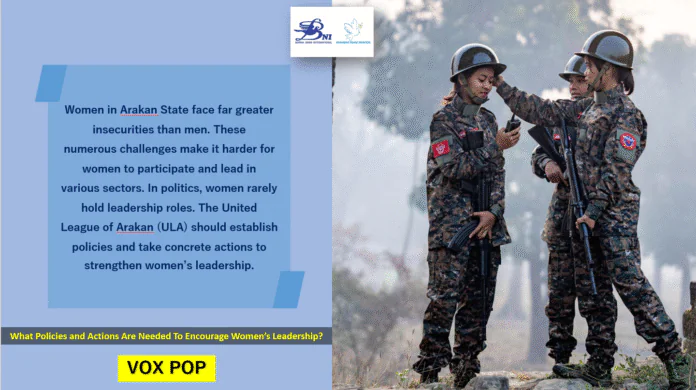What Policies and Actions Are Needed To Encourage Women’s Leadership?
The administrative systems of the Arakan People’s Revolutionary Government (APRG) are taking over in Arakan State’s townships, free from the military junta’s control. Women participate in various sectors under this government, but observers note that women rarely hold decision-making or leadership roles.
Women’s rights activists, marking Myanmar Women’s Day on 3 July, urged greater collaboration to involve women in political decision-making and leadership positions, as their inclusion remains limited.
Development Media Group (DMG) spoke with young women in Arakan State to hear their voices on what they believe women need to take on leadership roles and what actions should be taken.
A Young Women Activist:
We can’t build a nation with men alone. Women must actively participate and freely express their voices. When women’s voices fade, it severely hinders nation-building. Why? Because women’s involvement drives a country’s development and long-term sustainability. This impact extends beyond domestic affairs, affecting international relations and our ability to respond to other nations’ influence.
In Arakan, women’s voices have long been faint. Authorities must openly protect women from threats to their safety and ensure their right to freely speak and critique. Only then will we see women’s power shine across all sectors.
A Young Man:
In Arakan State’s current rebuilding phase, women’s participation remains very limited. In governance, we rarely hear of women taking leadership roles. We mostly see women working in healthcare as doctors or nurses, or at checkpoints recording entries and exits. In the higher levels of the administrative system, we hardly see women at all.
The Arakan People’s Revolutionary Government must actively involve capable women in Arakan’s rebuilding process, particularly in politics and the rule of law. By doing so, we can elevate women’s roles and strengthen their presence.
A Local Arakanese Woman:
In this situation, women face many challenges to collaborate and act. We lack human resources and technical support. Many young, educated, and active women have left the country.
Even if we try to implement or support something remotely, tight security restrictions constantly surround us. Oppression stifles us, preventing us from taking visible actions. These challenges stem from long-standing suppression in Arakan, where people feared openly engaging in activism.
Women’s participation is vital for building a nation. Women are mothers, and our society recognizes their compassionate and nurturing nature. Women play the biggest role in ensuring a family’s mental health, discipline, and unity. From families to communities, regions, and nations, this role expands. Strong, mentally stable, and organized mothers are invaluable to society.
A Man Advocating for Gender Equality:
Women in Arakan State face far greater insecurities than men. These numerous challenges make it harder for women to participate and lead in various sectors.
In politics, women’s leadership roles are almost non-existent. The United League of Arakan (ULA) should formulate policies and take concrete actions to strengthen women’s leadership. In the social sector, women’s leadership remains minimal. Few women lead charitable organizations. While some women’s groups do exist in CSOs and NGOs, male-led organizations dominate in both number and influence. The Arakan People’s Revolutionary Government and the broader community should actively prioritize and amplify women’s voices.
Women, who make up nearly 50% of Arakan’s population, have alarmingly low representation in critical decision-making processes. This imbalance represents a significant injustice that we must recognize.
We must not treat women’s participation and leadership as mere tokenism or quota-filling. Instead, we should set it as a vital goal for Arakan’s society. To ensure women’s lives are neither marginalized nor overlooked, the Arakan People’s Revolutionary Government bears a primary responsibility, and the entire Arakan community shares this duty to foster a thriving and inclusive society.
A Woman Working in an NGO:
Women hesitate to lead due to discrimination, lack of trust, gender-unequal governance structures, and restrictive religious beliefs.
When women actively participate in respective sectors, it builds trust in their capabilities and empowers them. Moreover, women bring unique perspectives that differ from men’s, which nations need to integrate for development. Therefore, women’s active involvement in a country’s progress is crucial.
Sent by DMG.

